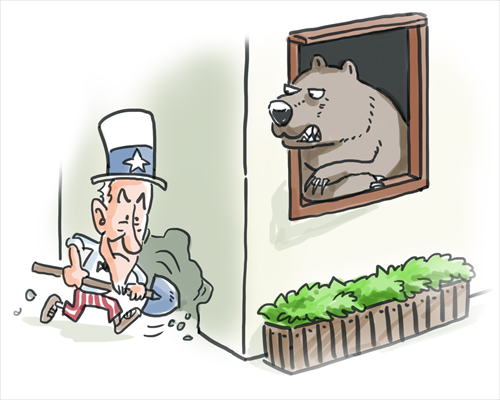Revived Cold War moves into Europe as Czech Republic and Hungary targeted

Illustration: Liu Rui/GT
The Republican Party victory in the November midterm elections will promote neoconservative foreign policy in the new Congress coming in January. Political pressures for a new Cold War undoubtedly will increase.
Although neoconservative thinking has been entrenched in the Democratic Party since the Truman years, it has come to dominate Republican Party thinking only in recent decades. The second Iraq War and subsequent Middle East policy is an example of both parties embracing neoconservatism.
US moves reviving the Cold War in Europe are no surprise to observers familiar with neoconservative foreign policy. Although anti-Russia posturing is standard for neoconservatives, support for interference in the internal affairs of Central and Eastern European countries is more active nowadays.
The case of Ukraine is well known, and the US made no secret of spending over $5 billion over the past two decades for color revolution and regime change there.
More recently, US coercion in various forms has targeted Hungary and the Czech Republic. In the eyes of policymakers, these countries are developing too close diplomatic and economic relations with Russia and China. Washington wants to isolate Russia and contain China.
Hungary is now targeted by Washington owing to the leadership of Prime Minister Viktor Orban and his Fidesz party. Washington objects to Hungary's independent foreign policy and to its relations with Russia and China. A particular sin is support for the multinational South Stream pipeline project to bring natural gas from Russia to Central Europe.
The ideology of Fidesz rejects the neoliberal economics of the "Washington Consensus." The party is committed to European integration, but sees a positive role for connectivity eastward on a Eurasian basis to support global development within a diverse multipolar environment.
Given this forward-looking orientation, it is not surprising that Orban and his party are targeted by neoconservatives involved in US foreign policy. For Washington and some influential circles in Europe, Hungary's stance is not acceptable. It cuts against a hegemonic transatlantic Western order as the center of world politics and economics.
One mechanism Washington uses to interfere in the internal politics of targeted countries is the National Endowment for Democracy (NED).
Czech President Milos Zeman was slammed in a recent Washington Post op-ed by Carl Gershman, head of NED. Gershman stridently objects to the Czech Republic's positive relations with Russia and China.
Gershman's personally insulting remarks against the Czech president are typical of the smear tactics of the neoconservatives and their allies. Gershman harshly attacked Zeman's friendly recent visit to China and castigated the Czech position that Tibet and Taiwan are internal matters.
Because NED is a government funded entity interfacing closely with the State Department and Congress, Gershman's attack is seen by critics as unseemly and counterproductive.
Some observers noting recent anti-government demonstrations in Prague point to overt and covert US interference in the internal affairs of the Czech Republic.
Misguided US policy toward Hungary and the Czech Republic contributes to tension in Central and Eastern Europe. Ukraine is already fundamentally destabilized.
The author is an educator and former senior professional staff member of the Senate Committee on Foreign Relations. opinion@globaltimes.com.cn